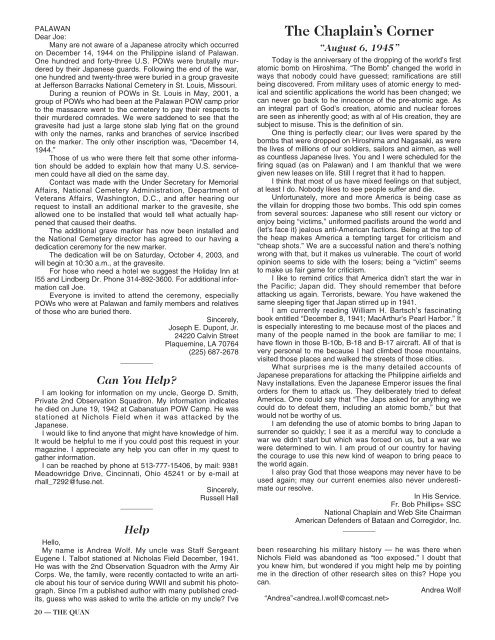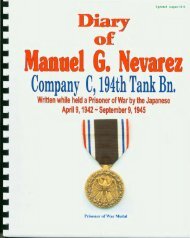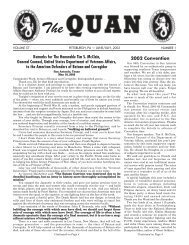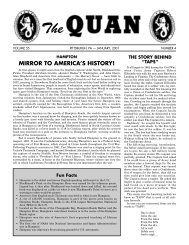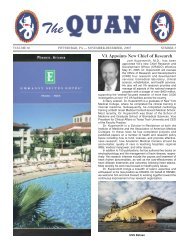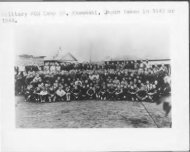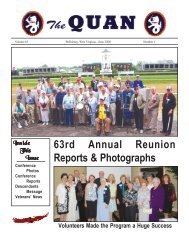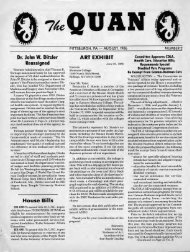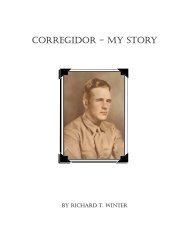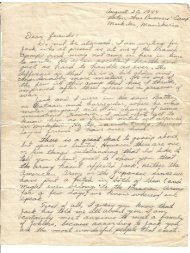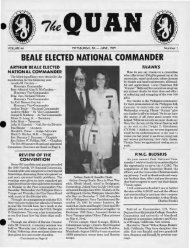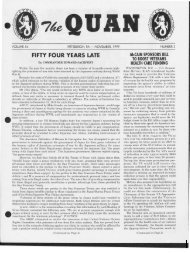Sept. 2003 - Philippine Defenders Main
Sept. 2003 - Philippine Defenders Main
Sept. 2003 - Philippine Defenders Main
You also want an ePaper? Increase the reach of your titles
YUMPU automatically turns print PDFs into web optimized ePapers that Google loves.
PALAWAN<br />
Dear Joe:<br />
Many are not aware of a Japanese atrocity which occurred<br />
on December 14, 1944 on the <strong>Philippine</strong> island of Palawan.<br />
One hundred and forty-three U.S. POWs were brutally murdered<br />
by their Japanese guards. Following the end of the war,<br />
one hundred and twenty-three were buried in a group gravesite<br />
at Jefferson Barracks National Cemetery in St. Louis, Missouri.<br />
During a reunion of POWs in St. Louis in May, 2001, a<br />
group of POWs who had been at the Palawan POW camp prior<br />
to the massacre went to the cemetery to pay their respects to<br />
their murdered comrades. We were saddened to see that the<br />
gravesite had just a large stone slab lying flat on the ground<br />
with only the names, ranks and branches of service inscribed<br />
on the marker. The only other inscription was, “December 14,<br />
1944.”<br />
Those of us who were there felt that some other information<br />
should be added to explain how that many U.S. servicemen<br />
could have all died on the same day.<br />
Contact was made with the Under Secretary for Memorial<br />
Affairs, National Cemetery Administration, Department of<br />
Veterans Affairs, Washington, D.C., and after hearing our<br />
request to install an additional marker to the gravesite, she<br />
allowed one to be installed that would tell what actually happened<br />
that caused their deaths.<br />
The additional grave marker has now been installed and<br />
the National Cemetery director has agreed to our having a<br />
dedication ceremony for the new marker.<br />
The dedication will be on Saturday, October 4, <strong>2003</strong>, and<br />
will begin at 10:30 a.m., at the gravesite.<br />
For hose who need a hotel we suggest the Holiday Inn at<br />
I55 and Lindberg Dr. Phone 314-892-3600. For additional information<br />
call Joe.<br />
Everyone is invited to attend the ceremony, especially<br />
POWs who were at Palawan and family members and relatives<br />
of those who are buried there.<br />
Sincerely,<br />
Joseph E. Dupont, Jr.<br />
24220 Calvin Street<br />
Plaquemine, LA 70764<br />
(225) 687-2678<br />
________<br />
Can You Help?<br />
I am looking for information on my uncle, George D. Smith,<br />
Private 2nd Observation Squadron. My information indicates<br />
he died on June 19, 1942 at Cabanatuan POW Camp. He was<br />
stationed at Nichols Field when it was attacked by the<br />
Japanese.<br />
I would like to find anyone that might have knowledge of him.<br />
It would be helpful to me if you could post this request in your<br />
magazine. I appreciate any help you can offer in my quest to<br />
gather information.<br />
I can be reached by phone at 513-777-15406, by mail: 9381<br />
Meadowridge Drive, Cincinnati, Ohio 45241 or by e-mail at<br />
rhall_7292@fuse.net.<br />
Sincerely,<br />
Russell Hall<br />
________<br />
20 — THE QUAN<br />
Help<br />
Hello,<br />
My name is Andrea Wolf. My uncle was Staff Sergeant<br />
Eugene I. Talbot stationed at Nicholas Field December, 1941.<br />
He was with the 2nd Observation Squadron with the Army Air<br />
Corps. We, the family, were recently contacted to write an article<br />
about his tour of service during WWII and submit his photograph.<br />
Since I’m a published author with many published credits,<br />
guess who was asked to write the article on my uncle? I’ve<br />
The Chaplain’s Corner<br />
“August 6, 1945”<br />
Today is the anniversary of the dropping of the world’s first<br />
atomic bomb on Hiroshima. “The Bomb” changed the world in<br />
ways that nobody could have guessed; ramifications are still<br />
being discovered. From military uses of atomic energy to medical<br />
and scientific applications the world has been changed; we<br />
can never go back to he innocence of the pre-atomic age. As<br />
an integral part of God’s creation, atomic and nuclear forces<br />
are seen as inherently good; as with al of His creation, they are<br />
subject to misuse. This is the definition of sin.<br />
One thing is perfectly clear; our lives were spared by the<br />
bombs that were dropped on Hiroshima and Nagasaki, as were<br />
the lives of millions of our soldiers, sailors and airmen, as well<br />
as countless Japanese lives. You and I were scheduled for the<br />
firing squad (as on Palawan) and I am thankful that we were<br />
given new leases on life. Still I regret that it had to happen.<br />
I think that most of us have mixed feelings on that subject,<br />
at least I do. Nobody likes to see people suffer and die.<br />
Unfortunately, more and more America is being case as<br />
the villain for dropping those two bombs. This odd spin comes<br />
from several sources: Japanese who still resent our victory or<br />
enjoy being “victims,” uniformed pacifists around the world and<br />
(let’s face it) jealous anti-American factions. Being at the top of<br />
the heap makes America a tempting target for criticism and<br />
“cheap shots.” We are a successful nation and there’s nothing<br />
wrong with that, but it makes us vulnerable. The court of world<br />
opinion seems to side with the losers; being a “victim” seems<br />
to make us fair game for criticism.<br />
I like to remind critics that America didn’t start the war in<br />
the Pacific; Japan did. They should remember that before<br />
attacking us again. Terrorists, beware. You have wakened the<br />
same sleeping tiger that Japan stirred up in 1941.<br />
I am currently reading William H. Bartsch’s fascinating<br />
book entitled “December 8, 1941; MacArthur’s Pearl Harbor.” It<br />
is especially interesting to me because most of the places and<br />
many of the people named in the book are familiar to me; I<br />
have flown in those B-10b, B-18 and B-17 aircraft. All of that is<br />
very personal to me because I had climbed those mountains,<br />
visited those places and walked the streets of those cities.<br />
What surprises me is the many detailed accounts of<br />
Japanese preparations for attacking the <strong>Philippine</strong> airfields and<br />
Navy installations. Even the Japanese Emperor issues the final<br />
orders for them to attack us. They deliberately tried to defeat<br />
America. One could say that “The Japs asked for anything we<br />
could do to defeat them, including an atomic bomb,” but that<br />
would not be worthy of us.<br />
I am defending the use of atomic bombs to bring Japan to<br />
surrender so quickly; I see it as a merciful way to conclude a<br />
war we didn’t start but which was forced on us, but a war we<br />
were determined to win. I am proud of our country for having<br />
the courage to use this new kind of weapon to bring peace to<br />
the world again.<br />
I also pray God that those weapons may never have to be<br />
used again; may our current enemies also never underestimate<br />
our resolve.<br />
In His Service.<br />
Fr. Bob Phillips+ SSC<br />
National Chaplain and Web Site Chairman<br />
American <strong>Defenders</strong> of Bataan and Corregidor, Inc.<br />
________<br />
been researching his military history — he was there when<br />
Nichols Field was abandoned as “too exposed.” I doubt that<br />
you knew him, but wondered if you might help me by pointing<br />
me in the direction of other research sites on this? Hope you<br />
can.<br />
Andrea Wolf<br />
“Andrea”


